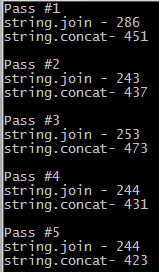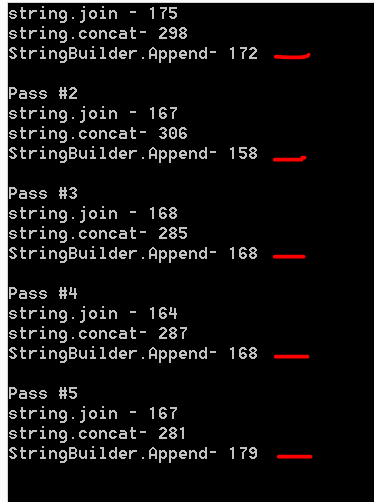I had a quick Google search for a comparison between string.concat and string.join, but I couldn’t find anything.
Say you want to construct the sentence “The quick brown fox jumps over the lazy dog”
This is comprised of 9 words, 8 spaces.
Using string.concat:
public void CreateSentanceUsingStringConcat()
{
string space = " ";
string the = "the";
string quick = "quick";
string brown = "brown";
string fox = "fox";
string jumps = "jumps";
string over = "over";
string lazy = "lazy";
string dog = "dog";
var result = string.Concat(the, space, quick, space, brown, space, fox, space, jumps, space, over, space, the, space, lazy, space, dog);
}
Using string.join
public void CreateSentanceUsingStringJoin()
{
var result = string.Join(space, the, quick, brown, fox, jumps, over, the, lazy, dog);
}
With String.concat, we must explicitly add the separator (in our case, space) between each string.
String.join however, allows us to specify the separator as the first parameter.
Performance
I wrote a small benchmark test on the two (see bottom of this post for code)
We can see string.join consistently performs better

Benchmark Code:
Note – This is available on GitHub – http://github.com/alexjamesbrown/StringConcatVsStringJoin
class Program
{
//string.concat or string.join a million times to get a better reading
const int numberOfTimesToRun = 1000000;
const string space = " ";
const string the = "the";
const string quick = "quick";
const string brown = "brown";
const string fox = "fox";
const string jumps = "jumps";
const string over = "over";
const string lazy = "lazy";
const string dog = "dog";
static void Main()
{
for (var i = 1; i <= 5; i++)
{
Console.WriteLine("Pass #" + i);
Go();
Console.WriteLine();
}
Console.Read();
}
private static void Go()
{
var concatStopWatch = Stopwatch.StartNew();
for (var i = 0; i < numberOfTimesToRun; i++)
string.Concat(the, space, quick, space, brown, space, fox, space, jumps, space, over, space, the, space, lazy, space, dog);
concatStopWatch.Stop();
var joinStopWatch = Stopwatch.StartNew();
for (var i = 0; i < numberOfTimesToRun; i++)
string.Join(space, the, quick, brown, fox, jumps, over, the, lazy, dog);
joinStopWatch.Stop();
Console.WriteLine("string.join - {0}", joinStopWatch.ElapsedMilliseconds);
Console.WriteLine("string.concat- {0}", concatStopWatch.ElapsedMilliseconds);
}
}
Update – StringBuilder.Append
In the comments, Dejan Stojanović put together a similar test using StringBuilder.Append – with similar, and sometimes slightly better results!

See this commit for the update
Leave a Reply